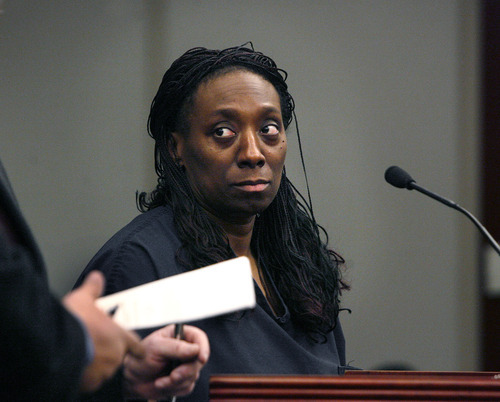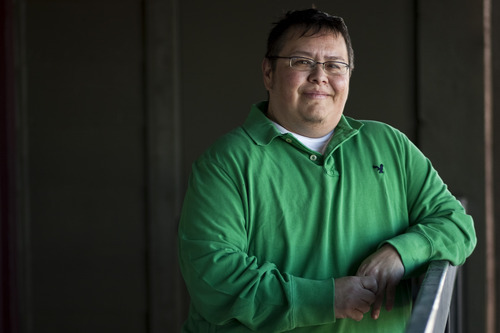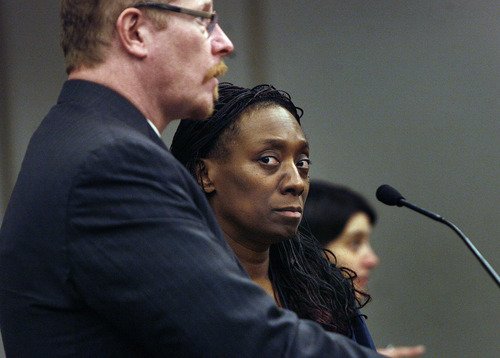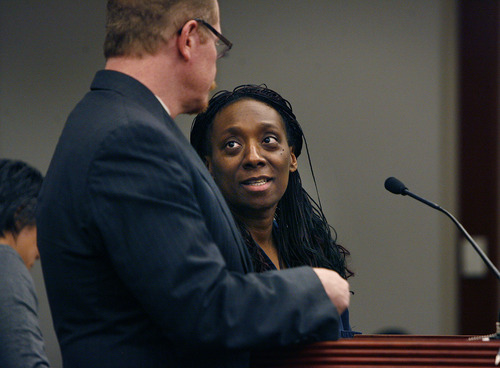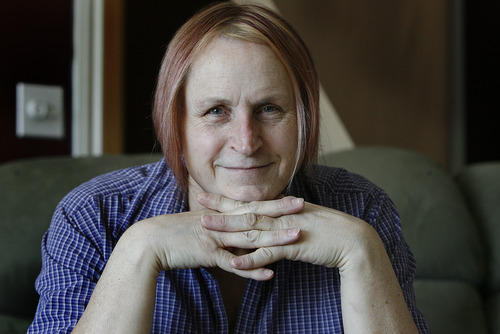This is an archived article that was published on sltrib.com in 2012, and information in the article may be outdated. It is provided only for personal research purposes and may not be reprinted.
Editor's note • The second of two stories, this draws on records released by medical licensing boards in New Jersey and Maryland, including interviews with physician Nicola Riley, injured patient D.B. and her mother, C.B. See part one at http://bit.ly/AhlI8i
—
Soon after she discovered she was pregnant, D.B. went online to find a way to end it.
The yellow advertisement from American Women's Services beckoned, and the 18-year-old quickly made an appointment. Clinic staff explained she would have to cross the state line — she was five months pregnant, and in her home state of New Jersey, the law limits later-term abortions to hospitals and surgical centers.
Physician Steven Chase Brigham gave her pills to start her contractions at his Voorhees clinic on Friday, Aug. 13, 2010. D.B. was in pain and nervous as she and two other patients followed him in caravan to a destination she said he would not name in advance.
Once in his clinic in the tiny town of Elkton, Md., Brigham introduced D.B. to Nicola Riley, a Utah doctor who would finish the abortion. Brigham rubbed the teen's shoulders and told her to relax as Riley administered the anesthesia.
When D.B. awoke, she was in nearby Union Hospital. She had been seriously injured during Riley's procedure, staff told her, and she needed to go by helicopter to Johns Hopkins Hospital for emergency surgery.
Now, nearly a year and a half later, Riley is charged with murder for killing the fetus D.B. paid $2,000 to abort.
While prosecutors decline to explain their reasoning, New Jersey's attorney general has attacked Brigham's two-state procedures as illegal. Brigham, who is not licensed in Maryland, was indicted with Riley in December for D.B.'s abortion. He also faces murder counts connected to four abortions the previous month.
Riley's lawyers see her charges as an attack on Roe v. Wade, the 1973 Supreme Court decision that legalized abortion.
"If doctors can be prosecuted for criminal offenses in connection with providing critical medical care to women who are in need of it, there is going to be a chilling effect," said Edwin Wall, Riley's Utah attorney.
But pro-choice groups don't appear to be taking up Riley's cause. "We want to make sure women's access to care is not restricted as a result of this," said ChristieLyn Diller, spokeswoman for Planned Parenthood of Maryland. But the organization was glad, she said, to see the state investigate the Elkton clinic.
"There's a lot of questionable things happening."
—
'Call the ambulance' • D.B.'s mother, C.B., could hear the teenager screaming during the abortion. Waiting with D.B.'s boyfriend, C.B. told a staff member, "I can't stand this," and walked down a hallway.
Eventually, Brigham and Riley emerged. "We're having complications," C.B. remembers one of them telling her. Still under anesthesia, D.B. was dressed and wheeled out of the room, a nurse holding her legs up in the air.
The doctors proposed pushing D.B. to the nearby hospital, C.B. remembers. "I said, you can't wheel her over there like that, call the ambulance."
Instead, Brigham drove in a private car, with Riley in the back seat monitoring D.B.
Riley later told Maryland investigators she rejected Brigham's idea of wheeling D.B. to the hospital and said she thought an ambulance would take too much time since the hospital was so close.
At Union Hospital, where staff had been unaware of the abortion clinic, doctors found Riley had punctured D.B.'s uterus in a rare but known risk of abortion and also damaged her bowel. Riley later told an investigator it was her first complication in five years of performing abortions.
—
'Threat to her patients' • Days after D.B.'s surgery, a Johns Hopkins physician and the Elkton Police Department filed complaints against Riley with the Maryland Board of Physicians. The board suspended her license in an emergency action on Aug. 31, 2010, calling her a "threat to her patients' safety," and continued investigating.
Maryland also ordered Brigham to cease and desist practicing unlicensed medicine there.
Searching his Elkton clinic, police found a chest freezer containing approximately 35 late-term fetuses, apparently awaiting medical disposal. A log showed abortions had been performed on fetuses up to 36 weeks gestation. A full-term fetus is 40 weeks.
New Jersey's Board of Medical Examiners, which suspended Brigham's license in his home state the month after D.B.'s abortion, alleged he performed at least 50 unlicensed abortions in Maryland over the year before she was injured.
Crossing state lines was part of his "scheme" to skirt New Jersey's laws blocking clinics from performing later term abortions, investigators said, calling contractors like Riley his "dupes." Brigham fought back, arguing his strategy was legal.
Riley had agreed to work for Brigham, commuting from Utah every other weekend, just two weeks before she performed D.B.'s abortion.
Its investigation complete, the Maryland board in January 2011 filed misconduct charges that could lead to Riley losing her license there. The board accuses Riley of knowingly practicing with an unlicensed physician, participating in the scheme to drive patients across state lines for abortions, and endangering D.B. by not calling for an ambulance.
Riley had defended her care of D.B. in her interview with investigators.
"I felt as though I handled it to the best of my ability." She later added: "Within 10 minutes, she was in the emergency room with an IV access being monitored, as should be done when a complication is noted."
—
Probing Riley's past • While scrutinizing Riley, Maryland officials discovered a surprise in her applications for a license there in 2010 and to the University of Utah's medical school in 1996.
Riley, a West Point graduate, was convicted in 1991 of stealing the identities of fellow soldiers at Fort Carson, Colo., to score jewelry from stores in Colorado Springs. She pleaded guilty to signing false names to credit card receipts for more than $3,000 in earrings, watches and other jewelry.
But in her license applications in Utah, Wyoming and Maryland, she claimed her convictions were based only in her failure to report that two subordinate soldiers were running the scam. She did not reveal the convictions to the U.
After Maryland's revelation, Riley surrendered her license in Wyoming, writing that she hadn't meant to misrepresent her crimes and blaming her faulty memory.
"I have tried very hard to put what happened behind me, and obtaining and reviewing the military court records [to complete the application] would have been extremely difficult and traumatic," she said.
Utah alone has allowed Riley to continue practicing medicine.
Licensing officials took no immediate action after D.B.'s injury. Months later, Riley agreed to stop performing abortions in Utah as of Feb. 1, 2011, until the challenge to her Maryland license is resolved. In August, Utah officials ordered her to pay a $10,000 fine for minimizing her role in the jewelry store fraud and to write an essay describing the steps she'll now take to be truthful.
On Friday, the Utah Attorney General's office refused to release the letter, saying it must protect Riley's right to a fair trial in Maryland.
U. administrators, who were not running background checks on medical school applicants when Riley applied, could have revoked her diploma, spokesman Chris Nelson said. They decided not to take that unprecedented step, but decline to explain their reasoning, he said.
—
Legal abortion or murder? • Brigham and Riley will be the first abortion doctors prosecuted under a 2005 Maryland law that allows a person to be charged for causing the death of a "viable" fetus, meaning it could survive outside the womb.
Maryland's abortion law, like Utah's, does not spell out when a fetus is viable. Utah hospitals say survival before 23 weeks gestation is rare. D.B. was 21.5 weeks pregnant.
Previously, the 2005 criminal law has been used when pregnant women were murdered or assaulted, according to the Philadelphia Inquirer.
The law exempts women seeking a legal abortion. It also doesn't apply to doctors who are following the law. On Friday, Riley's attorneys asked a Maryland judge to dismiss her indictment, arguing the law does not apply to her and seeking her release.
But Greg Stocks, a medical legal consultant in Baltimore, suggests prosecutors may be basing the charges on a legal theory that the doctors were not following the law — because the clinic's two-state routine meant it was an illegal operation and Brigham wasn't licensed in Maryland.
Had the women sought out the abortions in Maryland on their own without Brigham's involvement, the abortions would have been legal, Stocks said on his Law Med Blog.
The anti-abortion group Operation Rescue — which pushed Maryland officials to pursue criminal charges against Brigham and Riley — see their indictments as "a victory for the pro-life movement," said President Troy Newman on its website.
In Utah, Riley's supporters see her as a loving caregiver for her mother and two daughters and a compassionate doctor who has reached out to Utah's transgender community. Patient Dominique Storni was stunned by her Dec. 28 arrest for murder.
"It's all political in my opinion; they don't care that it hurts this woman's whole practice, that it hurts her children and her mother, they don't care that it hurts my community," Storni said.
Patient Dallas Carrizales is awaiting Riley's return to Utah: "I've been judged for a very long time. I try to sympathize."
Two days before her arrest, Riley was at the Porcupine Pub and Grille, her regular spot, drinking Guinness beer and talking about wanting to ski at Alta, said Josh Scheuerman, a bartender who has become friends with Riley over the years. He found the murder charges a "bizarre" contrast with the woman he knows.
"She's a loving mom, she's a good friend," he said, noting that he is pro-choice. But he, like other supporters, is struggling to understand the specifics of the Maryland charge.
D.B.'s mother expects they will testify in the doctors' murder cases.
As the mother told Maryland investigators in August 2010, "I wish I never heard of them."
Tribune reporter Melinda Rogers contributed to this story.
—
See part one at http://bit.ly/AhlI8i —
Editor's note
This story draws on records released by the New Jersey State Board of Medical Examiners and Maryland Board of Physicians, which included transcripts of investigators' interviews with physician Nicola Riley, injured patient D.B. and her mother, C.B. —
The life of Nicola Riley
This is the second of two stories exploring the life of Utah doctor Nicola Riley and the abortion she performed in 2010 that led to her December indictment in Maryland for murder. —
What's next?
P Utah abortion doctor Nicola Riley was arrested Dec. 28 in Utah for a Maryland indictment for murder in the first and second degree, and conspiracy to commit first-degree murder. She has been moved to Maryland and is awaiting prosecution there. On Friday, her attorneys sought her release, arguing that the law used by prosecutors does not apply to doctors performing legal abortions. —
What is Utah's abortion law?
Abortion in Utah is illegal if the fetus is "viable" — meaning able to live outside the womb — except in specific circumstances. Utah law does not define viability. It leaves it up to the woman's attending physician.
Aborting a viable fetus is legal if the abortion is necessary to avert the death or "irreversible impairment of a major bodily function" of the mother; if the fetus has a lethal defect or the pregnancy has occurred due to rape or incest.
Of the 3,446 abortions Utah women sought in 2010, the most recent year data is available, all but 11 were performed before 21 weeks gestation.


